View in other NatureServe Network Field Guides
NatureServe
Montana
Utah
Wyoming
Idaho
Wisconsin
British Columbia
South Carolina
Yukon
California
New York
Alpine Glacier Poppy - Papaver pygmaeum
Other Names:
Papaver radicatum var. pygmaeum
State Rank Reason (see State Rank above)
See rank details.
- Details on Status Ranking and Review
Population Size
Score2 - Small: Generally 2,000-10,000 individuals.
Range Extent
Score3 - Local Endemic or Very Small Montana Range: Generally restricted to an area <10,000 sq. miles (equivalent to the combined area of Phillips and Valley Counties) or <6 Sub-basins (4th code watersheds) Range-wide OR limited to one Sub-basin in Montana
CommentA local endemic. Known from Glacier National Park and surrounding mountains of B.C. and Alberta and 1 disjunct location from central Montana.
Area of Occupancy
Score2 - Low: Generally occurring in 4-10 Subwatersheds (6th Code HUC’s).
Environmental Specificity
Score1-2 - Moderate to High.
CommentAlpine species whose habitat does not appear to be highly restricted, but may need specific geologic or edaphic conditions of limited distribution.
Trends
Score0-2 - Stable to Moderate Declines:
CommentPopulation trends are unknown, though habitat appears to be stable. Decreases in snowpack may lead to downward trends.
Threats
Score0-1 - Low to Medium.
CommentHabitat is generally remote, eliminating most potential threats.
Intrinsic Vulnerability
Score1 - Moderate Vulnerability: Specific biological attributes, unusual life history characteristics or limited reproductive potential makes the species susceptible to extirpation from stochastic events or other adverse impacts to its habitat and slow to recover.
Raw Conservation Status Score
Score
9 to 13 total points scored out of a possible 19.
General Description
Tufted, taprooted, acaulescent, white-hispid perennial with milky sap. Leaf blades ovate, 1 cm or less long with deep, rounded lobes. Flowers solitary on peduncles 5–10 cm long, nodding in bud; sepals 2, falling in flower; petals 4, 5–10 mm long, salmon to orange. Fruit a white-bristly, many-seeded, conical capsule, 8–15 mm long (
Lesica et al. 2012. Manual of Montana Vascular Plants. BRIT Press. Fort Worth, TX).
Phenology
Flowering in late July, August and early September, fruiting in August.
Species Range
Montana Range
Range Descriptions
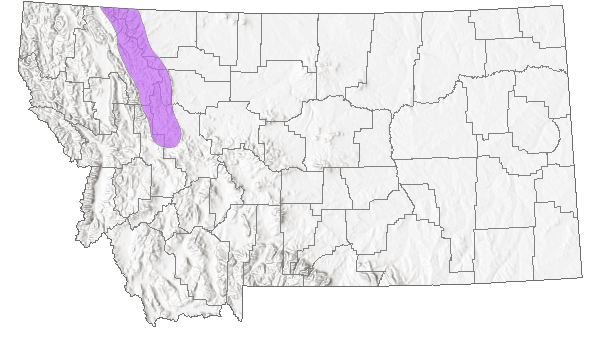
 Native
Native
Range Comments
Centered along Continental Divide extending 30 km north and 75 km south of the International Border (total: approx. 60 miles). The range includes the northwestern corner of Montana and adjacent areas of Alberta and British Columbia. Recent sources recognize the taxonomy here (Lesica 2012; Kiger and Murray 1997 in Fl. N. Amer. Vol. 3; The Plant List) in contrast to Welsh's interpretation (Utah Flora) that this taxon is a variety of P. radicatum.
Observations in Montana Natural Heritage Program Database
Number of Observations: 49
(Click on the following maps and charts to see full sized version)
Map Help and Descriptions
Relative Density
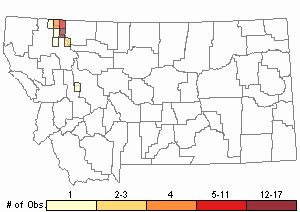
Recency
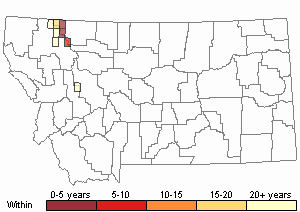
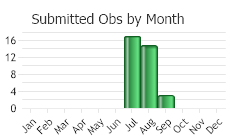
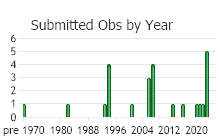
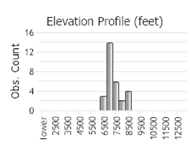 (Observations spanning multiple months or years are excluded from time charts)
(Observations spanning multiple months or years are excluded from time charts)
Habitat
Sparsely vegetated, stony soil of exposed slopes and ridge tops in the alpine zone.
National Vegetation Classification System Groups Associated with this Species
Alpine
Alpine - Sparse and Barren
Alpine - Vegetated
Stewardship Responsibility
References
- Literature Cited AboveLegend:
 View Online Publication
View Online Publication Lesica, P., M.T. Lavin, and P.F. Stickney. 2012. Manual of Montana Vascular Plants. Fort Worth, TX: BRIT Press. viii + 771 p.
Lesica, P., M.T. Lavin, and P.F. Stickney. 2012. Manual of Montana Vascular Plants. Fort Worth, TX: BRIT Press. viii + 771 p.
- Additional ReferencesLegend:
 View Online Publication
View Online Publication
Do you know of a citation we're missing? Lesica, P., M.T. Lavin, and P.F. Stickney. 2022. Manual of Montana Vascular Plants, Second Edition. Fort Worth, TX: BRIT Press. viii + 779 p.
Lesica, P., M.T. Lavin, and P.F. Stickney. 2022. Manual of Montana Vascular Plants, Second Edition. Fort Worth, TX: BRIT Press. viii + 779 p.
- Web Search Engines for Articles on "Alpine Glacier Poppy"





